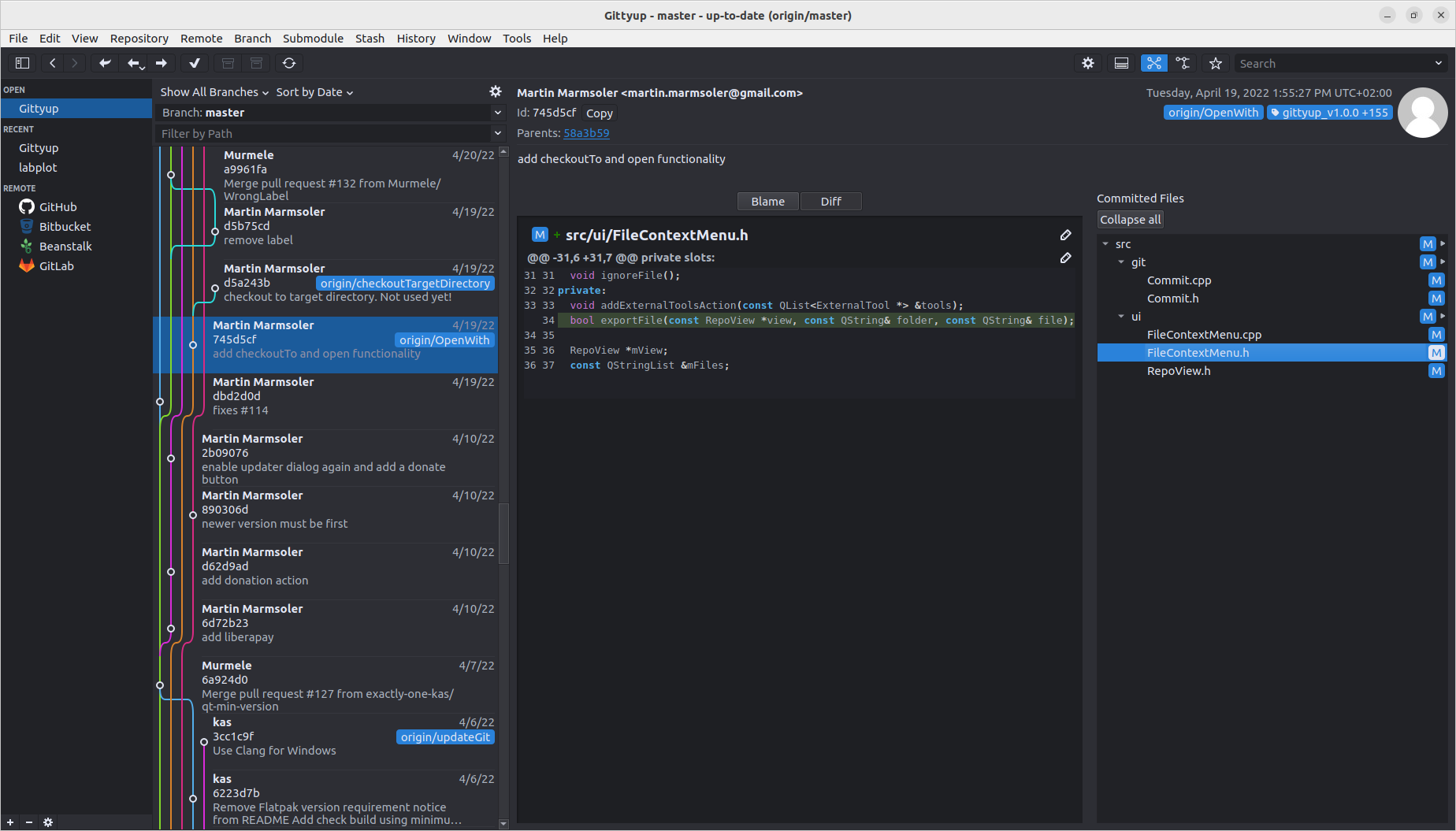
Gittyup is a graphical Git client designed to help you understand and manage your source code history. The latest stable release is available either as pre-built flatpak for Linux, 32 / 64 binary for Windows, macOS, or can be built from source by following the directions below.
The latest development version is available pre-built as well.
Gittyup is a continuation of the GitAhead client.
- Features
- How to Get Help
- Build Environment
- Dependencies
- How to Build
- How to Install
- How to Contribute
- License
To get an overview of the current features please have a look at the GitHub Page
Ask questions about building or using Gittyup on
Stack Overflow by
including the gittyup tag. Remember to search for existing questions
before creating a new one.
Report bugs in Gittyup by opening an issue in the issue tracker. Remember to search for existing issues before creating a new one.
If you still need help, check out our Matrix channel Gittyup:matrix.org.
- C++11 compiler
- Windows - MSVC >= 2017 recommended
- Linux - GCC >= 6.2 recommended
- macOS - Xcode >= 10.1 recommended
- CMake >= 3.3.1
- Ninja (optional)
External dependencies can be satisfied by system libraries or installed separately. Included dependencies are submodules of this repository. Some submodules are optional or may also be satisfied by system libraries.
External Dependencies
- Qt (required >= 5.12)
Included Dependencies
- libgit2 (required)
- cmark (required)
- git (only needed for the credential helpers)
- libssh2 (needed by
libgit2for SSH support) - openssl (needed by
libssh2andlibgit2on some platforms)
Note that building OpenSSL on Windows requires Perl and NASM.
Initialize Submodules
git submodule init
git submodule update
Build OpenSSL
# Start from root of gittyup repo.
cd dep/openssl/openssl
Windows:
perl Configure VC-WIN64A
nmake
macOS (Intel):
./Configure darwin64-x86_64-cc no-shared
make
macOS (Apple Silicon)
./Configure darwin64-arm64-cc no-shared
make
Linux:
./config -fPIC
make
Configure Build
# Start from root of gittyup repo.
mkdir -p build/release
cd build/release
cmake -G Ninja -DCMAKE_BUILD_TYPE=Release ../..
If you have Qt installed in a non-standard location, you may have to
specify the path to Qt by passing -DCMAKE_PREFIX_PATH=<path-to-qt>
where <path-to-qt> points to the Qt install directory that contains
bin, lib, etc.
Build
ninja
The easiest way to install Gittyup is by using Flatpak.
Arch Linux
Install the gittyup package from the Arch User Repository.
git clone https://aur.archlinux.org/gittyup.git
cd gittyup
makepkg -si
Or use an AUR helper.
Install gittyup-git for the VCS build.
Homebrew
Install the gittyup cask from Homebrew.
brew install gittyup
If you want a more pure console use, this script run flatpak version disowning the process and silence the output pushing it to /dev/null.
Just save the script somewhere in your path, for example /usr/bin (or ~/.local/bin if you have exported it), give execution permissions chmod +x, and run gittyup from your terminal.
#!/bin/bash
DIR=$(dirname "${BASH_SOURCE[0]}")
function run_disown() {
"$@" & disown
}
function run_disown_silence(){
run_disown "$@" 1>/dev/null 2>/dev/null
}
run_disown_silence flatpak run com.github.Murmele.GittyupWe welcome contributions of all kinds, including bug fixes, new features, documentation and translations. By contributing, you agree to release your contributions under the terms of the license.
Contribute by following the typical
GitHub workflow
for pull requests. Fork the repository and make changes on a new named
branch. Create pull requests against the master branch. Follow the
seven guidelines to writing a
great commit message.
Gittyup and its predecessor GitAhead are licensed under the MIT license. See LICENSE.md for details.

